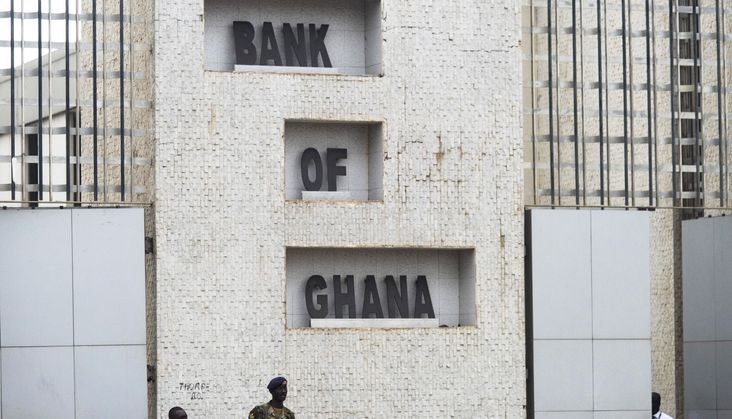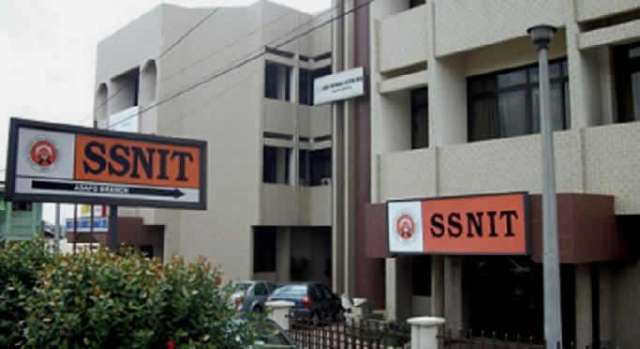 The Centre for Economic and Business Research (CEBRE), has suggested capping of interest rates as a way to compel banks to reduce their interests on loans.
In less than two years, the Bank of Ghana has responded to the calls for the policy rate to come down by reducing it from 26% in November 2016 to 17% in May 2018.
However, commercial banks are yet to fully respond to the reduction.
Speaking to 3FM Business, executive director of CEBRE Newlove Asamoah says capping will create a framework for banks to measure their lending rates.
Earlier in a statement, the Centre pointed out: “CEBRE is of the view that much as it believes in competition to bring the lending rate down, it has failed to do so and hence regulatory whip would be required to ensure that the banks do not enjoy ride on the back of the Ghanaian borrowers. Hence we are calling on the Central bank to adopt some measures to compel the banks to reduce their interest rates.”
Find full statement below
The Centre for Economic and Business Research (CEBRE), a policy think tank based in Kumasi is calling on Bank of Ghana to as a matter of urgency urge the financial institutions (Banks) in the country to reduce their lending rates so as to make cost of borrowing less expensive and encourage more businesses to borrow more money to expand their businesses to boost the economy.
The Central bank has the function of among other things, regulating and supervising the banking industry and setting the official interest rate (policy rate) which is used to manage lending rate, inflation and the country’s exchange rate – and ensuring that this rate takes effect via a variety of policy mechanisms.
In less than two years, the Bank of Ghana has responded to the calls for the policy rate to come down by reducing it from 26% in November 2016 to 17% in May 2018. However, the banks have not reacted in a responsible manner by reducing their lending rates to trend. Businesses are still accessing loans at very high interest rates making cost of doing business very costly which also makes the Ghanaian private sector not-competitive.
CEBRE is of the view that much as it believes in competition to bring the lending rate down, it has failed to do so and hence regulatory whip would be required to ensure that the banks do not enjoy ride on the back of the Ghanaian borrowers. Hence we are calling on the Central bank to adopt some measures to compel the banks to reduce their interest rates. Among the measures that the Central bank can use are as follows:
The Centre for Economic and Business Research (CEBRE), has suggested capping of interest rates as a way to compel banks to reduce their interests on loans.
In less than two years, the Bank of Ghana has responded to the calls for the policy rate to come down by reducing it from 26% in November 2016 to 17% in May 2018.
However, commercial banks are yet to fully respond to the reduction.
Speaking to 3FM Business, executive director of CEBRE Newlove Asamoah says capping will create a framework for banks to measure their lending rates.
Earlier in a statement, the Centre pointed out: “CEBRE is of the view that much as it believes in competition to bring the lending rate down, it has failed to do so and hence regulatory whip would be required to ensure that the banks do not enjoy ride on the back of the Ghanaian borrowers. Hence we are calling on the Central bank to adopt some measures to compel the banks to reduce their interest rates.”
Find full statement below
The Centre for Economic and Business Research (CEBRE), a policy think tank based in Kumasi is calling on Bank of Ghana to as a matter of urgency urge the financial institutions (Banks) in the country to reduce their lending rates so as to make cost of borrowing less expensive and encourage more businesses to borrow more money to expand their businesses to boost the economy.
The Central bank has the function of among other things, regulating and supervising the banking industry and setting the official interest rate (policy rate) which is used to manage lending rate, inflation and the country’s exchange rate – and ensuring that this rate takes effect via a variety of policy mechanisms.
In less than two years, the Bank of Ghana has responded to the calls for the policy rate to come down by reducing it from 26% in November 2016 to 17% in May 2018. However, the banks have not reacted in a responsible manner by reducing their lending rates to trend. Businesses are still accessing loans at very high interest rates making cost of doing business very costly which also makes the Ghanaian private sector not-competitive.
CEBRE is of the view that much as it believes in competition to bring the lending rate down, it has failed to do so and hence regulatory whip would be required to ensure that the banks do not enjoy ride on the back of the Ghanaian borrowers. Hence we are calling on the Central bank to adopt some measures to compel the banks to reduce their interest rates. Among the measures that the Central bank can use are as follows:
- Interest rate capping/ceiling.
This is when the Central Bank sets the maximum limit of lending rate above which it becomes illegal for a financial institution to charge. Interest rate ceilings can be justified on the basis that financial institutions are making excessive profits by charging usurious interest rates to clients. The Central Bank’s intervention is required to protect vulnerable clients from predatory lending practices. In implementing a cap, the Central bank will be aiming to incentivise lenders to push out the supply curve and increase access to credit while bringing down lending rates, assuming the cap is set below the market equilibrium.
For example, Bangladesh introduced interest rate caps on loans for large and medium-sized manufacturing enterprises in 2009 and it significantly increased the aggregate loans at the branch level. Bangladesh introduced interest rate caps at 13% on April 19, 2009 for the following categories of loans: housing loans, working capital loans to large and medium enterprises (LMEs), term loans to LMEs, agriculture and trade financing.
Kenya has also adopted interest rate capping since 2016. The interest capping law became operational on September 14, 2016. It was implemented following concerns raised by the public regarding the high cost of credit in Kenya, which was viewed as a hindrance to credit access by a large segment of the population. Kenya’s lending rate is now 13.64% as at December, 2017.from a high rate of about 32%. This has resulted in increased demand for credit.
Capping the lending rate will help the banks to reduce the percentage of non- performing loans as borrowers can now afford to pay the lower interest rate and hence reduce defaulting.
It will also force the banks to do better due diligence on the credits they grant since they cannot recover the bad loans from higher interest rate.
High interest rates among Ghanaian banks is a function of the high operating cost which some banks have self-inflicted themselves. Whilst banks in Asia and Latin America are investing in cost savers, some banks in Ghana keep on adding cost to their operations. In most countries, for example, high school graduates are bank tellers. In Ghana, it possible to find masters holders as tellers in most banks. This will undoubtedly increase the cost of operations.
- The cap should be made in such a way that it will not affect the Central bank’s monetary policy. For example it could be set as “not more than 4 percentage point above the policy rate”. This will give room to the Central bank to adjust the policy rate upwards as and when the need arises for the Central bank to use its monetary policy to achieve its objectives.
- Government treasury bills/securities rates should be reduced further to make it unattractive to the banks so that the cap in interest rate does not lead to reduction in financial intermediation and a shift towards the purchase of government security by the banks.
Below is a table of interest rates for selected Countries in Africa
| Country |
Current average rate (%) |
Date |
Highest rate (%) |
Lowest rate (%) |
| Ghana |
35.50 |
Feb/18 |
42.84 |
21.24 |
| Angola |
25.21 |
Mar/18 |
25.21 |
14.46 |
| Egypt |
19.30 |
Mar/18 |
21.15 |
10.6 |
| Tanzania |
16.47 |
Mar/18 |
17.91 |
7.53 |
| Kenya |
13.64 |
Dec/17 |
32.28 |
9 |
| South Africa |
10.00 |
Apr/18 |
25.5 |
5.5 |
| Mauritius |
8.50 |
Feb/18 |
13 |
8 |
| Botswana |
6.50 |
Feb/18 |
16.5 |
6.5 |
| Cote D’Voire |
4.50 |
Apr/18 |
4.50 |
3.50 |
|
|
4.50 |
Apr/18 |
4.50 |
3.50 |
| Morocco |
2.25 |
Apr/18 |
7 |
2.25 |
Source: https://tradingeconomics.com/ghana/interest-rate
CEBRE believe that if the above measures are put in place, more credit will be made available at cheaper cost for production to increase all economic activities and boost the Ghanaian economy.
Thank you.
signed
Gordon Newlove Asamoah
Executive Director, CEBRE
By Grace asare/3FM/3news.com]]>
 The Centre for Economic and Business Research (CEBRE), has suggested capping of interest rates as a way to compel banks to reduce their interests on loans.
In less than two years, the Bank of Ghana has responded to the calls for the policy rate to come down by reducing it from 26% in November 2016 to 17% in May 2018.
However, commercial banks are yet to fully respond to the reduction.
Speaking to 3FM Business, executive director of CEBRE Newlove Asamoah says capping will create a framework for banks to measure their lending rates.
Earlier in a statement, the Centre pointed out: “CEBRE is of the view that much as it believes in competition to bring the lending rate down, it has failed to do so and hence regulatory whip would be required to ensure that the banks do not enjoy ride on the back of the Ghanaian borrowers. Hence we are calling on the Central bank to adopt some measures to compel the banks to reduce their interest rates.”
Find full statement below
The Centre for Economic and Business Research (CEBRE), a policy think tank based in Kumasi is calling on Bank of Ghana to as a matter of urgency urge the financial institutions (Banks) in the country to reduce their lending rates so as to make cost of borrowing less expensive and encourage more businesses to borrow more money to expand their businesses to boost the economy.
The Central bank has the function of among other things, regulating and supervising the banking industry and setting the official interest rate (policy rate) which is used to manage lending rate, inflation and the country’s exchange rate – and ensuring that this rate takes effect via a variety of policy mechanisms.
In less than two years, the Bank of Ghana has responded to the calls for the policy rate to come down by reducing it from 26% in November 2016 to 17% in May 2018. However, the banks have not reacted in a responsible manner by reducing their lending rates to trend. Businesses are still accessing loans at very high interest rates making cost of doing business very costly which also makes the Ghanaian private sector not-competitive.
CEBRE is of the view that much as it believes in competition to bring the lending rate down, it has failed to do so and hence regulatory whip would be required to ensure that the banks do not enjoy ride on the back of the Ghanaian borrowers. Hence we are calling on the Central bank to adopt some measures to compel the banks to reduce their interest rates. Among the measures that the Central bank can use are as follows:
The Centre for Economic and Business Research (CEBRE), has suggested capping of interest rates as a way to compel banks to reduce their interests on loans.
In less than two years, the Bank of Ghana has responded to the calls for the policy rate to come down by reducing it from 26% in November 2016 to 17% in May 2018.
However, commercial banks are yet to fully respond to the reduction.
Speaking to 3FM Business, executive director of CEBRE Newlove Asamoah says capping will create a framework for banks to measure their lending rates.
Earlier in a statement, the Centre pointed out: “CEBRE is of the view that much as it believes in competition to bring the lending rate down, it has failed to do so and hence regulatory whip would be required to ensure that the banks do not enjoy ride on the back of the Ghanaian borrowers. Hence we are calling on the Central bank to adopt some measures to compel the banks to reduce their interest rates.”
Find full statement below
The Centre for Economic and Business Research (CEBRE), a policy think tank based in Kumasi is calling on Bank of Ghana to as a matter of urgency urge the financial institutions (Banks) in the country to reduce their lending rates so as to make cost of borrowing less expensive and encourage more businesses to borrow more money to expand their businesses to boost the economy.
The Central bank has the function of among other things, regulating and supervising the banking industry and setting the official interest rate (policy rate) which is used to manage lending rate, inflation and the country’s exchange rate – and ensuring that this rate takes effect via a variety of policy mechanisms.
In less than two years, the Bank of Ghana has responded to the calls for the policy rate to come down by reducing it from 26% in November 2016 to 17% in May 2018. However, the banks have not reacted in a responsible manner by reducing their lending rates to trend. Businesses are still accessing loans at very high interest rates making cost of doing business very costly which also makes the Ghanaian private sector not-competitive.
CEBRE is of the view that much as it believes in competition to bring the lending rate down, it has failed to do so and hence regulatory whip would be required to ensure that the banks do not enjoy ride on the back of the Ghanaian borrowers. Hence we are calling on the Central bank to adopt some measures to compel the banks to reduce their interest rates. Among the measures that the Central bank can use are as follows:
















